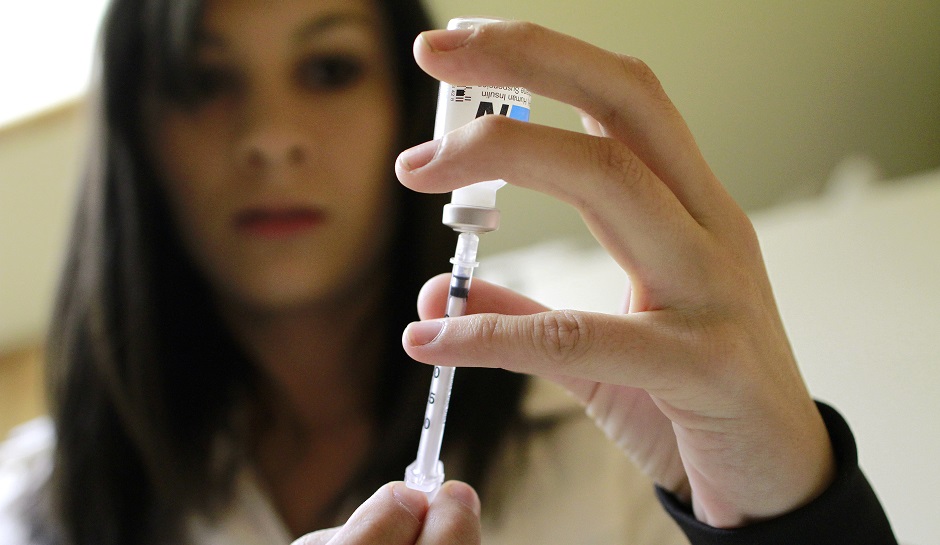
Diabetic women between the ages of 15 and 30 are regularly skipping their insulin injections in order to lose weight.
Campaigners and doctors who know call this eating disorder diabulimia, but it is, as yet, an unrecognised disease.
Type 1 diabetes happens when the immune system accidentally destroys the cells in the pancreas which produce the hormone. This essential chemical ferries the energy from food around the body. But without it, the symptoms of diabetes appear: frequent urination, dehydration and utter exhaustion. The condition also often results in rapid weight loss.
Skipping insulin can negatively affect,
- Fertility
- Nerve damage
- bone loss
- Heart and kidney failure.
- Dangerously high blood sugar can even trigger blindness.
A recent study in Australia said it was more likely that 85% of 15-18 year old women regularly omit their insulin in order to lose weight. Research also suggests women with type 1 diabetes are three times more likely to develop an eating disorder than women who don’t have diabetes.
Watch Out Tips
- Avoid Diet Talk.
Never ask someone with an eating disorder for diet tips. Actually, I believe you should never ask anyone for reasons behind their weight loss or gain at all. - Avoid body-focused compliments.
“You look so much better. Your face is so much fuller!”
OK, so we might know these are intended as compliments because they show compassion and concern from someone who is relieved to see you looking healthier. But again, someone with an eating disorder can manipulate those words automatically. We might hear “you look fat” or “you must not be ill anymore.” Outside appearance can also be deceptive. A person with diabulimia may present as OK on the outside yet be in acute diabetic ketoacidosis (DKA) and in need of emergency assistance. Ultimately, any kind of commentary relating to appearance around someone with an eating disorder should be vetoed wherever possible. Positive or negative, it can be taken the wrong way. - Educate yourself on type 1 diabetes and eating disorders.
It can be really disheartening to hear ignorant comments like, “Did you become diabetic from eating too much sugar?” or “Are you allowed to eat that?!” Just no. Educate yourself, please. - Don’t tell someone to stop talking about their illness.
Don’t stigmatize something many people with diabetes and eating disorders have struggled to accept and acknowledge. Let us talk, it helps and is far better than denying it exists. - Don’t comment on food.
“Wow, that’s a huge dinner.” or “Ooh that looks like a nice treat!” Comments ike these aren’t helpful to someone struggling with an eating disorder or diabulimia. Refrain from commenting on food unless you are asked for help or guidance. Don’t be the food police!
- Don’t try to guilt someone into eating.
“Please eat, for me?” This kind of emotional pleading is not fair for someone with an eating disorder. Their recovery is their own and you can support in ways that don’t involve manipulation. Making them eat because they feel they have to may lead to feelings of shame and possible self-damaging behaviors later on. - Someone’s eating disorder is about them, not you.
This often comes from a parent who feels helpless. Personally, the hardest part of being ill is the hurt it causes to loved ones. It is a mental disorder and rational thought can be compromised. - Understand eating disorders aren’t just about weight.
“I wish I could lose weight that quickly!” or “I wish I was as thin as you.”
These are all completely inappropriate comments if someone doesn’t know the circumstances of someone’s weight or behaviors. Eating disorders are all specific to the one struggling. For people with diabulimia, weight is not an accurate risk indicator, HBA1C levels are. People with diabulimia will often have huge fluctuations in weight as they manipulate insulin levels and so this cannot be used to determine how well or unwell someone is.
- Mind the way you talk about dangers of an eating disorder.
“This could kill you, you know?” Sometimes, being told of the damage we are doing to ourselves can come off as patronizing. It’s not lack of intelligence that causes a person with an eating disorder to neglect their health needs. An eating disorder can make someone focus more on their destructive behaviors than their safety. - Don’t imply someone with an eating disorder can’t date.
“You do realize men like a bit of meat on a woman’s bones, right?” It’s hurtful to imply someone with an eating disorder is engaging in the behavior to “get a man.” Eating disorders are not about vanity.
Treatment for type 1 diabetes may require anything from nutrition education to psychotherapy to medication. Diabulimia may have serious health consequences if left untreated.
